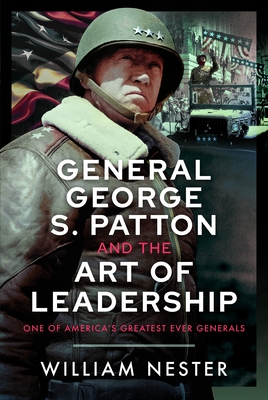General George S. Patton and the Art of Leadership: One of America's Greatest Ever Generals

General George S. Patton and the Art of Leadership: One of America's Greatest Ever Generals
For General George S. Patton, "Leadership is the thing that wins battles. I have it--but I'll be damned if I can define it. Probably it consists in knowing what you want to do and then doing it and getting mad if anyone steps in the way. Self-confidence and leadership are twin brothers."
Indeed, Patton excelled at virtually every dimension of leadership, most vitally as a war commander. His record as a general is clear. The larger, more armored, and better supplied his armies, and the freer he was to decide what to do with them, the more rapid and further they advanced to inflict more defeats on the enemy. In that no other American army commander matched him during World War II. That ranks Patton among the Valhalla of America's greatest generals, with him most resembling Thomas "Stonewall" Jackson and Nathan Bedford Forrest as a fast-moving, hard-hitting commander who repeatedly outflanked and devastated enemy forces.
Patton led from the front and tried to inspire his troops by being a model officer who exemplified bravery, problem-solving, tactical brilliance, and decisiveness. He was in near constant motion from his headquarters to rear echelon and front line troops, everywhere exhorting them to greater efforts and overcoming challenges, at times enduring shell fire, strafing, mines, snipers, and other dangers. His greatest attribute was his drive to be the best at whatever he chose or was ordered to do. He recognized that developing a successful military career depended not just on will and chance but on incessant training and study. Yet he believed that instincts were just as vital as skills in being a successful leader: "I have a sixth sense in war and...can put myself in the enemies head and I am also willing to take chances."
Patton harbored plenty of flaws. He was a narcissist who constantly strove to be center-stage and outshine his rivals. He contrived an idealized version of himself as the epitome of the brilliant general and fearless soldier, immaculately dressed, and spent his life playing that role. He was a braggart who regaled listeners with at times exaggerated tales of his past deeds and those yet to come. His boasting did have one positive element. He sought to surpass his past glories with greater future victories.
Patton seesawed between elation and despair, rage and compassion. He could chew out a subordi
PRP: 235.29 Lei
Acesta este Prețul Recomandat de Producător. Prețul de vânzare al produsului este afișat mai jos.
211.76Lei
211.76Lei
235.29 LeiLivrare in 2-4 saptamani
Descrierea produsului
For General George S. Patton, "Leadership is the thing that wins battles. I have it--but I'll be damned if I can define it. Probably it consists in knowing what you want to do and then doing it and getting mad if anyone steps in the way. Self-confidence and leadership are twin brothers."
Indeed, Patton excelled at virtually every dimension of leadership, most vitally as a war commander. His record as a general is clear. The larger, more armored, and better supplied his armies, and the freer he was to decide what to do with them, the more rapid and further they advanced to inflict more defeats on the enemy. In that no other American army commander matched him during World War II. That ranks Patton among the Valhalla of America's greatest generals, with him most resembling Thomas "Stonewall" Jackson and Nathan Bedford Forrest as a fast-moving, hard-hitting commander who repeatedly outflanked and devastated enemy forces.
Patton led from the front and tried to inspire his troops by being a model officer who exemplified bravery, problem-solving, tactical brilliance, and decisiveness. He was in near constant motion from his headquarters to rear echelon and front line troops, everywhere exhorting them to greater efforts and overcoming challenges, at times enduring shell fire, strafing, mines, snipers, and other dangers. His greatest attribute was his drive to be the best at whatever he chose or was ordered to do. He recognized that developing a successful military career depended not just on will and chance but on incessant training and study. Yet he believed that instincts were just as vital as skills in being a successful leader: "I have a sixth sense in war and...can put myself in the enemies head and I am also willing to take chances."
Patton harbored plenty of flaws. He was a narcissist who constantly strove to be center-stage and outshine his rivals. He contrived an idealized version of himself as the epitome of the brilliant general and fearless soldier, immaculately dressed, and spent his life playing that role. He was a braggart who regaled listeners with at times exaggerated tales of his past deeds and those yet to come. His boasting did have one positive element. He sought to surpass his past glories with greater future victories.
Patton seesawed between elation and despair, rage and compassion. He could chew out a subordi
Detaliile produsului










